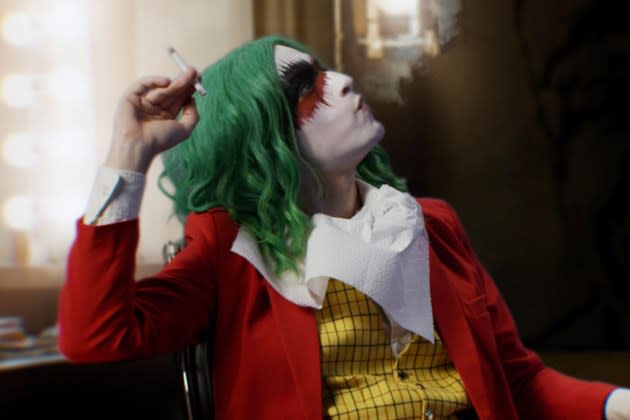‘The People’s Joker’ Review: A Sharp DC Parody Delightfully Crossed With a Trans Coming-of-Age Tale
- Oops!Something went wrong.Please try again later.

Vera Drew’s debut feature The People’s Joker evades all easy descriptions. It’s a trans coming-of-age film constructed with deep knowledge and affection for DC comics (and their many film adaptations) that also takes aim at the male-dominated comedy community and the mechanisms that determine stardom. Combining comedy, action, drama and an impressive number of different animation styles, The People’s Joker is a self-conscious, intentional cult film, crafted with genuine love for everything in the margins. And it tells a story everyone can relate to, about a kid growing up and trying to find happiness and success in a dark, troubled world. And in this world, Batman is the villain. He rules Gotham with an army of drones, while using his power and influence to control every aspect of media and culture — even comedy.
But not for long. Joker (Drew) arrives in Gotham with one purpose: to become a comedian and join the cast of one of the biggest comedy shows in the country, UCB Live. After an unhappy childhood in Smallville with their depressed mother (Lynn Downey) and absent father, Joker wants to be a comedian, like their comedy idol Ra’s al Ghul (David Liebe Hart). In flashback, we learn that Joker had a classic “egg crack” moment where they realized that their gender wasn’t right for them. But in a heartbreaking scene, Joker tells their mother that they feel like they’re in the wrong body.
More from The Hollywood Reporter
Justice Smith, Dominic Sessa Join Ariana Greenblatt in 'Now You See Me 3' (Exclusive)
Mayim Bialik Claims Abuse Detailed in 'Quiet on Set' Wasn't Just at Nickelodeon
Shonda Rhimes Says She Had to Hire Security After Some 'Grey's Anatomy' Fans "Got Mean"
This moment changes their relationship — and Joker’s life — forever. Instead of listening to her child, she panics and puts them on Smylex, a drug that’s supposed to make people happy. But in reality, it’s a gas that forces the corners of the face up into a smile, giving only the appearance of contentment. Smylex is a clever physical manifestation of the way society forces Joker to hide who they are and pretend to be happy about it. Joker tries their best to be a man, but when they finally get the opportunity to audition for UCB Live, they realize their own lack of identity makes it impossible to tell jokes. They’re not funny because they don’t know who they are.
Thankfully, at the audition they meet Penguin (Nathan Faustyn) who becomes a friend and business partner. They open their own anti-comedy club and it’s soon full of other struggling comics, who also just happen to be enemies of Batman. In a way, they create their own comedy-focused suicide squad with everyone from Bane (Dan Curry) to Poison Ivy (Ruin Carroll) to The Riddler all there working out their material and their shared hatred for Batman, who in this universe has taken a fascist hold on all of Gotham.
Joker even meets and falls in love with another clown, the troubled Mr. J (Kane Distler), a trans man with a mysterious past. Not only does this love open Joker up and allow them to be happy for the first time in their life, it also helps them come out. With Mr. J, Joker finally transitions, becoming the woman she’s always wanted to be.
These days it’s rare to see new American films with casual sexuality, especially the ones involving superheroes. Joker and Mr. J’s romance is refreshingly “t4t” (trans for trans), but that’s not the only thing that makes it unique. In a vulnerable, two-dimensional animated sequence, we observe Joker and Mr. J in bed, sharing secrets and each other’s bodies. We even get to hear a little dirty talk, but their tenderness toward each other prevents it from feeling lurid. For a sizable chunk of the film we get to see this funny trans woman in love. And even if their union is bound for trouble due to the demands of the story, their time together feels both special and mundane. Two comedians dating is often a recipe for disaster, no matter who they are. Sure, she’s raging against Batman and his fascist hold on Gotham, but she’s also just a chick in her 20s still figuring things out.
Packed to the brim with genuinely funny jokes, unique character designs and fearless commitment to its own complex narrative, The People’s Joker does with one film what most superhero stories stretch out with sequels, prequels and tie-in shows. Drew and co-writer Bri LeRose thrust us directly into their version of the DC Universe, using sight gags and in-universe TV commercials and clips to fill out all the details within the confines of their small cast and modest budget.
But The People’s Joker was a community effort as well, with an impressively large animation and production team. Watching the film, one senses it was a labor of love fueled by a dedicated group of independent artists striving to create something new that pays homage to the characters and worlds that meant the most to them growing up. Together, Drew and her team have made something truly one-of-a-kind.
Best of The Hollywood Reporter

